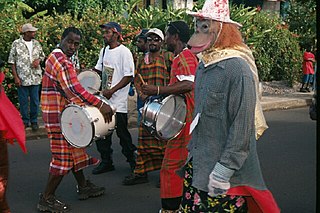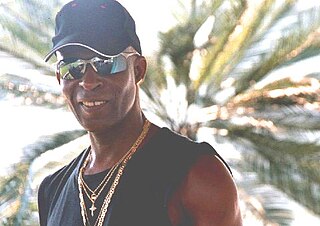Soca music is a genre of music defined by Lord Shorty, its inventor, as the "Soul of Calypso", which has influences of African and East Indian rhythms. It was originally spelled "sokah" by its inventor but through an error in a local newspaper when reporting on the new music it was erroneously spelled "soca"; Lord Shorty confirmed the error but chose to leave it that way to avoid confusion. It is a genre of music that originated in Trinidad and Tobago in the early 1970s and developed into a range of styles during the 1980s and after. Soca was initially developed by Lord Shorty in an effort to revive traditional calypso, the popularity of which had been flagging amongst younger generations in Trinidad due to the rise in popularity of reggae from Jamaica and soul and funk from the United States. Soca is an offshoot of calypso/kaiso, with influences from East Indian rhythms and hooks.
The music of Trinidad and Tobago is best known for its calypso music, soca music, chutney music, and steelpan. Calypso's internationally noted performances in the 1950s from native artists such as Lord Melody, Lord Kitchener and Mighty Sparrow. The art form was most popularised at that time by Harry Belafonte. Along with folk songs and African- and Indian-based classical forms, cross-cultural interactions have produced other indigenous forms of music including soca, rapso, parang, chutney, and other derivative and fusion styles. There are also local communities which practice and experiment with international classical and pop music, often fusing them with local steelpan instruments.

The music of Dominica includes a variety of genres including all the popular genres of the world. Popular music is widespread, with a number of native Dominican performers gaining national fame in imported genres such as calypso, reggae, soca, kompa, zouk and rock and roll. Dominica's own popular music industry has created a form called bouyon, which combines elements from several styles and has achieved a wide fanbase in Dominica. Groups include WCK, Native musicians in various forms, such as reggae, kadans (Ophelia Marie, and calypso, have also become stars at home and abroad.
The music of the Lesser Antilles encompasses the music of this chain of small islands making up the eastern and southern portion of the West Indies. Lesser Antillean music is part of the broader category of Caribbean music; much of the folk and popular music is also a part of the Afro-American musical complex, being a mixture of African, European and indigenous American elements. The Lesser Antilles' musical cultures are largely based on the music of African slaves brought by European traders and colonizers. The African musical elements are a hybrid of instruments and styles from numerous West African tribes, while the European slaveholders added their own musics into the mix, as did immigrants from India. In many ways, the Lesser Antilles can be musically divided based on which nation colonized them.
The music of Anguilla is part of the Lesser Antillean music area. The earliest people on the island were the Caribs and Arawaks, who arrived from South America. English settlers from St Kitts and Irish people colonized the island later. Unlike regional neighbors, however, the plantation system of agriculture that relied on chattel slavery never took root in Anguilla, causing a distinctly independent cultural makeup. The most recent influences on Anguilla's musical life come from elsewhere in the Caribbean, especially the music of Trinidad and Tobago and Jamaica, as well as abroad, especially the music of the United States and the United Kingdom. Anguilla's Rastafarian heritage has played a role in the island's music and culture and produced influential figures like activist Ijahnya Christian and Robert Athlyi Rogers, the author of The Holy Piby.
The music of the Virgin Islands reflects long-standing West Indian cultural ties to the island nations to the south, the islands' African heritage and European colonial history, as well as recent North American influences. Though the United States Virgin Islands and British Virgin Islands are politically separate, they maintain close cultural ties. From its neighbors, the Virgin Islands has imported various pan-Caribbean genres of music, including calypso music and soca music from Trinidad and reggae from Jamaica.
The music of the former Netherlands Antilles is a mixture of native, African and European elements, and is closely connected with trends from neighboring countries such as Venezuela and Colombia and islands such as Puerto Rico, Cuba, Santo Domingo, Haiti, Martinique, Trinidad, Dominica, and Guadeloupe. The former Netherlands Antilles islands of Curaçao and Aruba are known for their typical waltzes, danzas, mazurkas and a kind of music called tumba, which is named after the conga drums that accompany it.
The music of Saint Vincent and the Grenadines includes thriving music scenes based on Big Drum, calypso, soca, steelpan and also reggae. String band music, quadrille, bélé music and traditional storytelling are also popular.

The music of Antigua and Barbuda is largely African in character, and has only felt a limited influence from European styles due to the population of Antigua and Barbuda descending mostly from West Africans who were made slaves by Europeans.
Byron Lee and the Dragonaires are a Jamaican ska, calypso and soca band. The band played a crucial pioneering role in bringing Caribbean music to the world. Byron Lee died on 4 November 2008, after suffering from cancer for a sustained period.

Destra Garcia is a Trinidadian musician, singer and songwriter of soca music. She is also known by the mononym Destra. She is one of the most popular female soca artists in the world.
Alison Amanda Hinds is a British-born Bajan soca artist and songwriter based in Barbados. She is one of the most revered soca singers in the world. Alison is also known for her contributions to the genre of Soca music. Alison is often referred to as the "Queen of Soca" due to her significant impact on the genre.

The Antiguan Carnival is a celebration of the emancipation of slavery in the country held annually from the end of July to the first Tuesday in August. The most important day is that of the j'ouvert, in which brass and steel bands perform for much of the island's population. Barbuda's Carnival, held in June, is known as Caribana. The Antiguan and Barbudan Carnivals replaced the Old Time Christmas Festival in 1957, with hopes of inspiring tourism in Antigua and Barbuda. Some elements of the Christmas Festival remain in the modern Carnival celebrations.

Machel Jesus Montano is a Trinidadian soca recording artist and record producer. Known for his high energy, fast-paced, and often unpredictable on-stage performances, he is one of the genre's most popular artists.
Xtatik is a Trinidad and Tobago Soca band led by Machel Montano.
El-A-Kru is an Antiguan soca band. The name derives from "Little Antigua Crew".

Any Minute Now is an album by Trinidadian Soca artist Machel Montano and his band Xtatik released in 1999.

JFC is a reggae, calypso, and soca band based in Arlington, Virginia in the Northern Virginia / Washington, D.C. area. Starting as an active band in 2005, their music is produced independently.

Claudette Peters, OH is an Antiguan soca and soul singer-songwriter. Peters is best known as Antigua's "Soca Diva" and the Queen of Soca of Antigua and Barbuda was the lead vocalist for the Taxik Band. Claudette has multiple Jumpy and Groovy Party Monarch crowns in which she won from the annual Antigua Carnival's Party Monarch Competition to justify her claim to fame.









